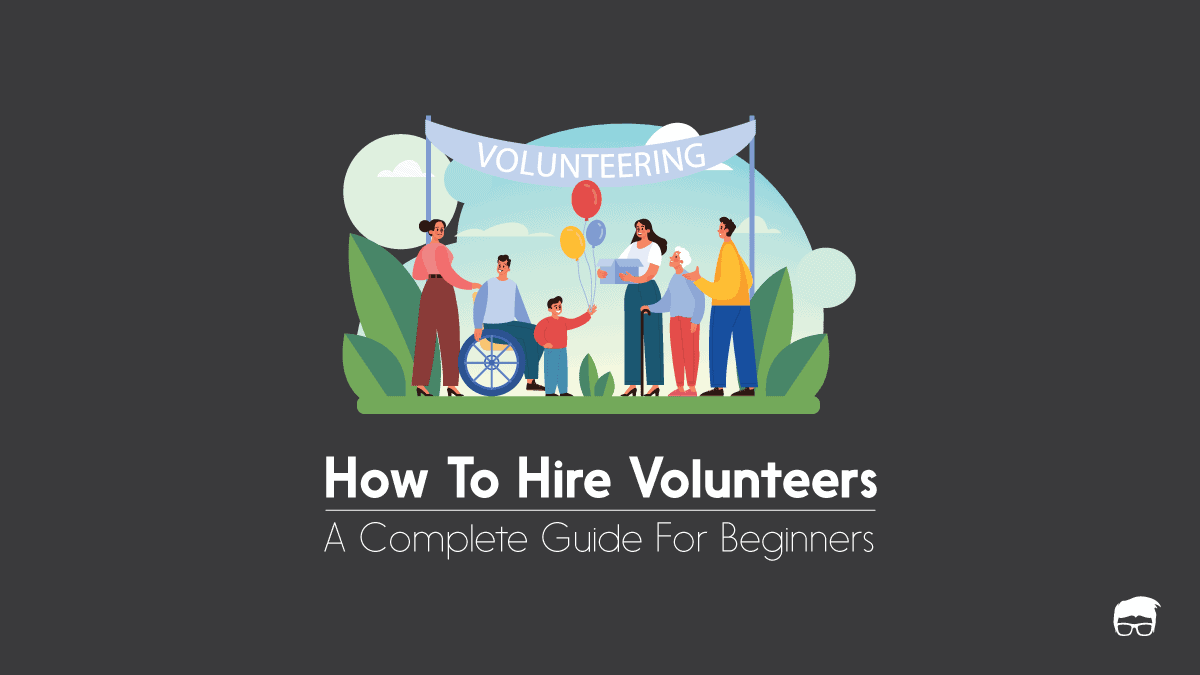We have heard the term “volunteers” used quite often around us. Whether it is a school festival, community service, or even hospitals, volunteers are recruited to any specific sector, making them a valuable resource for all.
Every part of society benefits from having volunteers. Even if they do not have a permanent position as a healthcare professional or a teaching professional, they bring many benefits, especially to non-profit organisations. For example, the last time you walked through a park, volunteers may have been the ones responsible for maintaining it. They may also be the ones who organise charity events or help out at local food banks.
If you are an organisation (especially a non-profit organisation) looking to hire volunteers, let us give you a simple guide on how to do so.
Why Are Volunteers Important?
Volunteers form the spine of all communities, and their contributions are priceless. They bring passion, dedication, and unique skills that can be invaluable to any organisation.
Most NPOS work on a low budget since their primary focus is helping the community rather than getting profits. Due to this, they would not be able to hire people on a low salary. On the other hand, volunteers are willing to dedicate their time and skills without expecting monetary compensation. This makes them an essential asset for NPOS.
However, the importance of volunteers is not limited to NPOS only. Here’s why volunteers are important for any organisation:
- They bring in diverse skills: Volunteers come from different backgrounds, ages, and professions. This diversity brings a variety of skills to an organisation that can be beneficial in achieving its goals.
- They provide new perspectives: With their unique experiences and perspectives, volunteers can offer fresh ideas and solutions to problems that organisations may not have thought about before.
- They increase community involvement: Individuals become more connected to their community by volunteering. This leads to increased participation in various activities and initiatives within the community, making it stronger and more engaged.
How To Hire Volunteers?
Hiring a volunteer isn’t the same as hiring an employee. You can’t just post a job and call it a day. Volunteers are people who want to offer their time and skills to a cause they care about—without expecting payment.
To bring volunteers on board effectively, here’s a step-by-step process:
- Know what you need help with: Get specific about the tasks and projects where you need volunteers. This makes it easier to attract people who care about your cause and have the right skills.
- Create a volunteer program: Design a clear program that outlines roles, responsibilities, and expectations. This helps set boundaries and ensures a smooth experience for everyone involved.
- Advertise your volunteer opportunities: Use social media, community boards, and other channels to spread the word. Be sure to include key details, like time commitment, required skills, and how to apply.
- Screen candidates: Just like you would with an employee, it’s important to screen volunteers. This can mean interviews, background checks, or calling references.
- Provide training and support: Once you’ve selected your volunteers, give them the training and support they need to do the job well. This also helps them feel valued and connected to your mission.
- Show appreciation: Volunteers are giving their time freely. Make sure to acknowledge their contributions. A simple thank-you note or a volunteer appreciation event can go a long way.
Identify What You Need Help With
Before starting the recruitment process, it is important to identify what tasks and projects you need volunteers for. This will help attract individuals who are genuinely interested in your cause and have relevant skills to contribute.
When creating a list of volunteer opportunities, consider the following factors:
- Work – What tasks or projects do you need help with? Make a list of specific tasks and skills required for each opportunity.
- Time commitment – How much time are you expecting volunteers to commit? Will it be a one-time event or an ongoing project?
- Location – Where will the volunteering take place? Is it on-site, off-site, or virtual?
- Skills required – What specific skills or experience are necessary for each opportunity?
Every organisation, especially an NPO, has different objectives to carry out. You need to find volunteers who willingly and passionately support your cause, are interested in the tasks you need help with, and have relevant skills to contribute.
Once you’re clear with the objective, move to defining volunteer roles by providing clear descriptions of the tasks and responsibilities involved. This involves including the responsibilities of the role and the time commitment.
Once done, it’s time for you to move ahead and plan a volunteer program.
Create A Volunteer Program
A volunteer program is a structured guide that clearly outlines volunteers’ roles, responsibilities, and expectations in your organisation. It’s like defining tasks, but now you’re writing everything down in detail. Here’s what to include:
- Program goals and objectives – What are you hoping to achieve through your volunteer program? For example, increasing community involvement or expanding your organisation’s reach.
- Roles and responsibilities – Once you have identified what tasks you need help with, it is important to outline each volunteer position’s specific roles and responsibilities. This will help volunteers understand their role within the organisation and prevent any confusion.
- Time commitment – Clearly define how much time you expect volunteers to commit. This can include details such as the duration of each shift, frequency of volunteering, and a minimum commitment period.
- Training and support – It is important to provide proper training and support for volunteers so that they can effectively fulfil their roles. This can include on-the-job training, mentorship programs, or workshops.
- Code of conduct/expectations – This should outline the expected behaviour and conduct of volunteers within your organisation, including policies on confidentiality, punctuality, and professionalism.
- Benefits of volunteering – Let potential volunteers know what they can expect to gain from their experience with your organisation. This could include networking opportunities, skill development, or simply the satisfaction of contributing to a meaningful cause.
It’s like writing a job description but with a more personal touch and community-focused approach. Once you have a well-defined volunteer program, it’s time to spread the word and attract potential candidates.
Advertise Your Volunteer Opportunities
Advertising volunteer opportunities doesn’t always mean spending money. Be it an NPO, event, or any CSR project, you can make use of different platforms to reach out to potential volunteers, such as:
- Social media – Share your volunteer opportunities on your organisation’s social media pages and encourage your followers to share them with their networks.
- Community boards – Many local community centres, libraries, and cafes have bulletin boards where you can post flyers, advertising your volunteer opportunities.
- Online volunteering websites – Several online platforms are dedicated to connecting organisations with volunteers. Some examples include VolunteerMatch, Idealist, and Do-it.org.
- VolunteerMatch: Allows you to post your volunteer opportunities for free and connects you with potential volunteers based on their skills and interests.
- Idealist: Offers a search engine for volunteering opportunities, as well as resources on how to manage volunteers effectively.
- Do-it.org: Provides a directory of volunteering opportunities in the UK, making it easier for individuals to find relevant opportunities in their local area.
Screen Potential Candidates
Once your ads start getting traction, you will receive inquiries from potential volunteers. It is important to have a screening process in place to ensure that the individuals you select are committed, reliable, and aligned with your organisation’s values.
- Application forms – Ask interested candidates to fill out an application form that includes relevant information such as their skills, availability, and why they are interested in volunteering with your organisation. Your form can include specific questions like “What motivates you to volunteer?” or “What skills do you hope to gain from this experience?”
- Background checks – Depending on the nature of the volunteer opportunity, you may need to conduct background checks on certain candidates. This could include reference checks or criminal record checks. It’s important, as even though these individuals are volunteering, they will be representing your organisation and it’s important to ensure their credibility.
- Conduct in-person interviews: Interviews are a great way to get a deeper understanding of a candidate’s personality and see if they’re a good fit for the role. If possible, have two interviewers in the room. This gives you a more balanced view of the candidate.
- Ask focused questions: Make sure your questions dig into key areas like skills, experience, motivation, and how well they align with your organisation’s mission. Here are a few examples:
- Why do you want to volunteer with us?
- What skills or experience can you bring to the table?
- How much time can you realistically commit?
- Assess their communication skills: As volunteers may be working with different groups of people, it’s important to find out if they have effective communication skills. You can assess this by asking them about a challenging situation they’ve faced and how they handled it.
- Evaluate their enthusiasm and attitude: Enthusiasm and a positive attitude are key traits for successful volunteers. Try to gauge this through the candidate’s body language, tone of voice, and overall energy during the interview.
Post-Hiring Activities
Volunteers don’t necessarily come with all the skills and knowledge needed for their designated roles. It’s important to continue supporting them even after they have been selected. And this support is not just limited to orientation and onboarding. It’s vital to provide them with proper training and support so they can effectively contribute to your organisation’s mission.
- On-the-job training: This involves showing volunteers how to complete specific tasks within their roles. It could be shadowing an experienced volunteer or staff member or receiving hands-on instruction from a supervisor.
- Mentorship programs: Pair new volunteers with experienced volunteers who can act as mentors and provide guidance and support throughout their volunteering experience. This not only helps with training but also fosters a sense of community within your organisation.
- Workshops/seminars: Organise workshops or seminars on relevant topics to provide volunteers with additional knowledge and skills. This could include topics such as fundraising, event planning, or effective communication.
- Regular check-ins: It’s important to regularly check in with your volunteers to see how they are doing and if they need any additional support or resources. This also provides an opportunity for volunteers to share their feedback and suggestions for improvement.
Also, know that volunteer turnover is inevitable. Some volunteers may leave due to personal commitments, while others may not have a positive experience. To reduce it for certain extent, show your volunteers appreciation and recognition for their contributions. This could be through a simple thank you note, public recognition on social media or at events, or a small token of appreciation such as a certificate or gift card.
Can You Hire Volunteers for a For-Profit Company?
While not-for-profit organisations often rely on volunteers, for-profit companies may also benefit from having volunteers. But it’s a tricky area:
- Legal considerations: In many countries, including the U.S., the Fair Labor Standards Act (FLSA) and state laws govern whether an individual can volunteer at a for-profit company. Generally, volunteering is only allowed for charitable or humanitarian purposes. Volunteers may be considered employees and entitled to minimum wage and other benefits if volunteers do the work that benefits the company financially.
- Perception: Some people may view companies that use volunteers as taking advantage of free labour or not valuing their employees enough to pay them. It’s important to consider how using volunteers may impact your company’s public image.
- Commitment and motivation: For-profit companies often have higher expectations for productivity and performance than non-profits. Not fully committed or motivated volunteers may not meet these expectations, leading to frustration and inefficiency.
Alternatives To Volunteers
For-profit companies can look into other ways to legally bring in workers or reduce labour costs. One of them is through internships. Internships are a common way for companies to attract individuals who are looking to gain experience. This is because the focus would be mainly on learning and development rather than benefitting from the company.
Another way for a company to reduce labour costs would be through employee volunteering programs. Some for-profit businesses have volunteer programs in which workers engage in community service or charitable activities during working hours. These activities aim to give back to the community and reflect the company’s ideals, but they do not involve volunteers working directly for the company’s profit.
A startup consultant, digital marketer, traveller, and philomath. Aashish has worked with over 20 startups and successfully helped them ideate, raise money, and succeed. When not working, he can be found hiking, camping, and stargazing.









